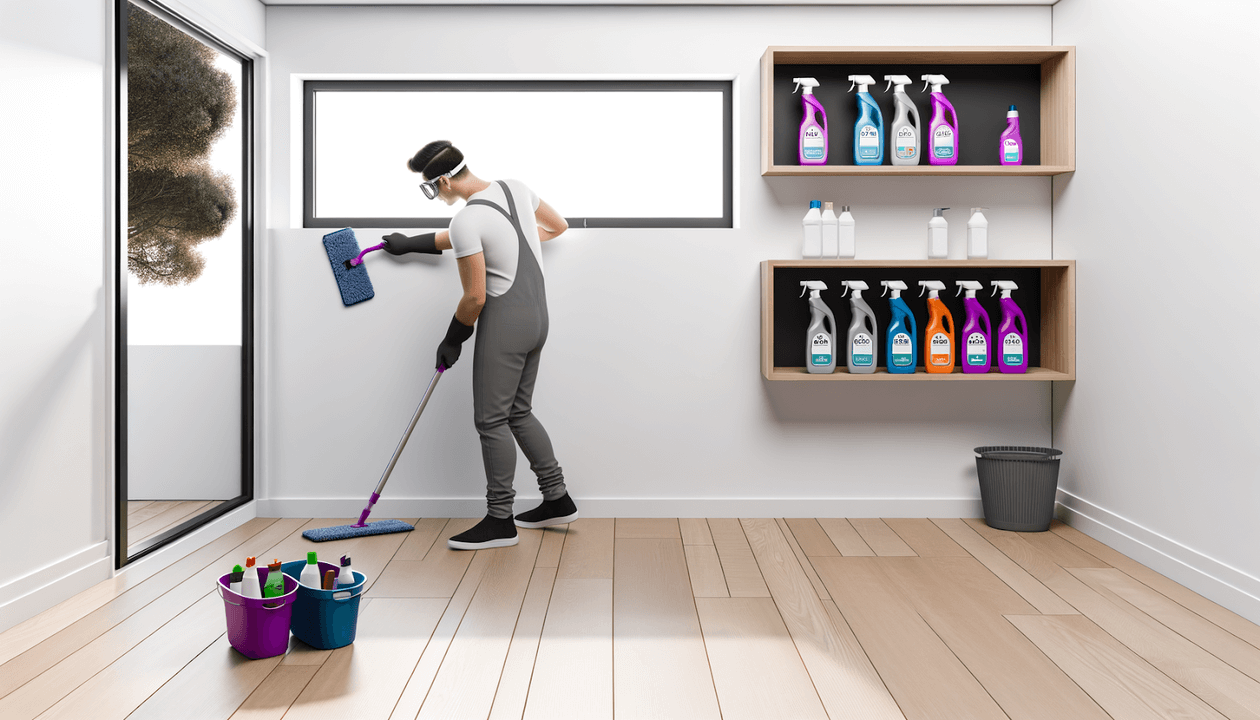
What is The Impact of Floor Cleaning Chemicals on Indoor Air Quality
Ever spilled something sticky on the floor and grabbed the first cleaner you could find? You might want to rethink that next time. The type of floor cleaning chemical you choose can have a significant impact not only on the cleanliness of your floors but also on your indoor air quality. Let's dive into how certain chemicals affect the air you breathe and what choices you can make for a healthier home environment.
The Role of Floor Cleaning Chemicals in Indoor Air Quality
A lot of us use cleaning chemicals without much thought to their broader implications—especially on indoor air quality. The fragrance and residues left by some floor cleaning chemicals can degrade air quality, potentially leading to respiratory irritation or other health issues. The air quality becomes an issue particularly when dealing with harsh chemicals or strong fragrances. The enclosed spaces of our homes trap these substances, unlike the outdoors where they can disperse easily.
Types of Floor Cleaning Chemicals: What You Need to Know
Alkaline Chemicals
- Potassium Hydroxide: This agent breaks down tough stains effectively without harming the surface. It's a reliable choice, but you should be cautious to prevent overuse.
- Sodium Hydroxide: Commonly found in scrubber dryers, this substance boasts strong cleaning properties. Use it wisely to minimise air quality impacts.
- Bleach: Known for its disinfecting prowess, bleach can release harmful gases if mishandled.
- Ammonia: A great general cleaner, but beware its hazardous reaction when mixed with certain other chemicals.
Acidic Solutions
These can come in handy especially for tough spots, but require caution:
- Hydrochloric Acid: Effective for removing inorganic deposits, but must be diluted carefully. Inhalation of fumes can be dangerous.
- Acetic Acid (Vinegar): A milder acid, great for cleaning without drastic damage, but remember, it shouldn't be mixed with bleach.
Detergents and Degreasers
These are crucial in removing grime and bringing out the shine:
- Detergents are designed to work with other agents to enhance cleaning effectiveness.
- Degreasing agents are often necessary when dealing with kitchen floors where grease accumulates.
The Impact of Cleaning Chemicals on Different Floor Types
Using the right cleaner for your specific floor not only ensures cleanliness but also preserves the surface. Here's a lowdown on how different cleaning agents should be paired with various floors:
- Concrete Floors: Opt for alkaline or pH-neutral cleaners and rinse thoroughly.
- Carpet Floors: Use specially formulated carpet cleaners and avoid high alkalinity.
- Marble Floors: Use a pH between 7 and 10, avoiding acidic solutions.
- Tile Floors: Most all-purpose cleaners are suitable, but be mindful of tile grout.
- Hardwood Floors: Use pH-neutral or slightly acidic cleaners. Avoid excessive water.
- Laminate and Linoleum Floors: Gentle, pH-neutral cleaners are essential, as harsh chemicals may damage them.
- Vinyl and Epoxy Floors: Use mild detergents or commercial cleaners formulated for these types.
- Terrazzo and Rubber Floors: Go for pH-neutral cleaners and steer clear of abrasives.
Recommendations for Healthier Cleaning Chemical Choices
For those of us looking to keep our indoors pristine without compromising air quality, here are some tips:
- Low-VOC Products: Volatile Organic Compounds (VOCs) can vaporise and contribute to poor indoor air quality. Opt for products labelled low-VOC or VOC-free.
- Fragrance-Free or Natural Options: Products free from synthetic fragrances can reduce indoor air pollution.
- Eco-Friendly Alternatives: Consider green cleaning products that pose less risk to both health and the environment.
Safety Precautions When Handling Floor Cleaning Chemicals
Working with cleaning agents safely is non-negotiable. Here is what you should keep in mind:
General Safety Measures
- Refer to the Material Safety and Data Sheets (MSDSs) for chemical guidelines.
- Use Personal Protective Equipment (PPE) such as gloves and goggles.
- Ensure proper ventilation.
- Avoid mixing chemicals unless specified as safe.
- Properly label and store all chemicals.
Specific Advice for Common Chemicals
Some chemicals require extra care:
- Bleach: Always use as recommended and avoid mixing with ammonia.
- Ammonia: Handle in well-ventilated spaces and avoid mixing with bleach.
Best Practices for Maintaining Your Floors
Regular maintenance will reduce the need for harsh chemicals. Consider these best practices:
- Match Cleaner to Surface: Always use the recommended cleaner for your specific floor type.
- Dilution and Application: Follow dilution instructions on product labels to avoid excess chemical use.
- Regular Upkeep: Routine cleaning lowers the need for intense cleaning agents. Use microfiber mops and HEPA vacuums to minimise dirt before it necessitates heavy-duty cleaning.
Conclusion: Making Wise Choices with Floor Cleaning Chemicals
Our choice of floor cleaning chemicals doesn't just affect the surface we walk on. These choices have broader implications for the air we breathe within our homes. Being aware of the impacts of these products and considering safer alternatives can make a significant difference in maintaining not only a clean floor but also a healthy living environment. As we go about our daily routines, let's ensure we're making choices that safeguard our indoor air quality for a healthier home.
